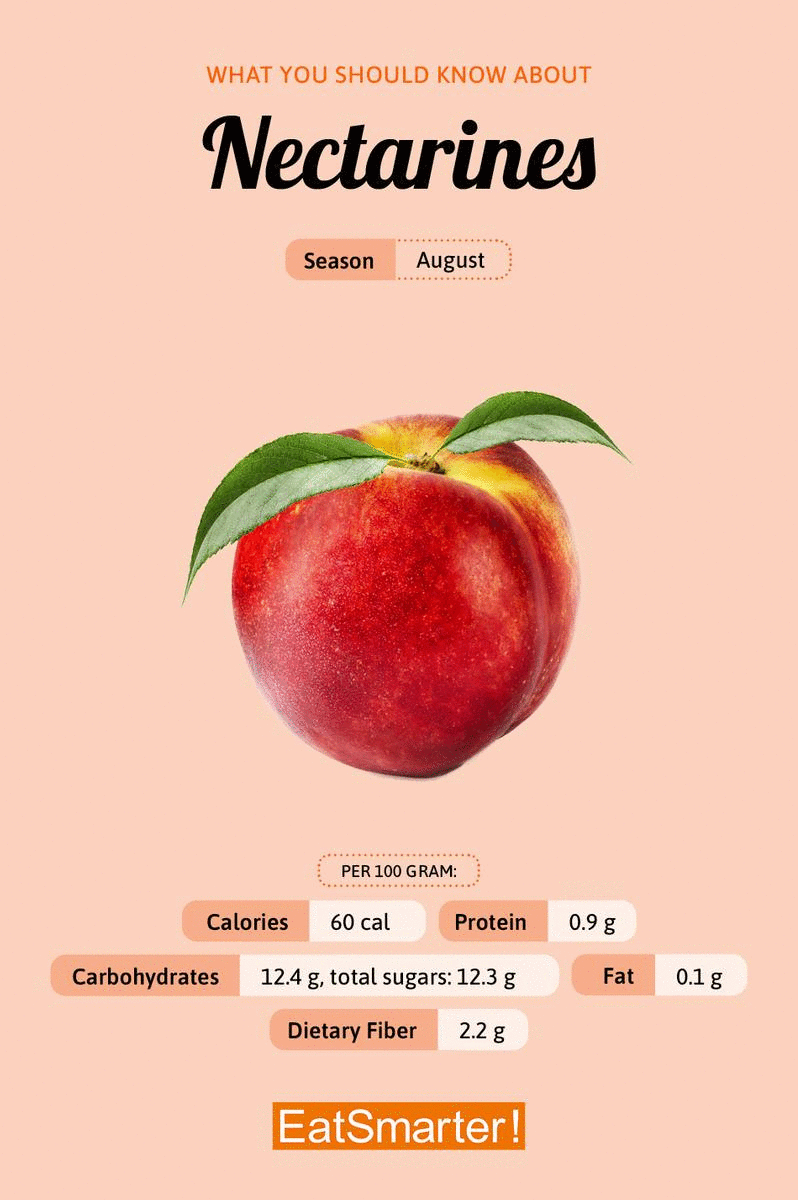Nectarine
This delicious stone fruit might not be as well-known as its cousin, the peach. However the nectarine’s incredible flavor and juicy texture has increasingly made it one of the most popular ingredients to cook with in the summer, from savory dishes like salads to delectible crumbles and cakes. What’s more? It’s extremely healthy! Read below for more.

Nectarines…
- ...are good for your skin and eyes.100 grams of nectarines contain 73 micrograms of vitamin A and 440 micrograms of beta-carotene, two vital substances for maintaining healthy skin and vision.
- ...help protect your cells.The nectarine isn’t one of the most vitamin-E rich fruits, however with 500 micrograms per 100 gram serving, it still packs a significant amount of the essential vitamin, which even in smaller doses helps to protect the body cells from harmful free radicals and premature aging.
- ...are heaty-healthy.100 g nectarine contains 10 micrograms of vitamin K, a good 15% of the average daily requirement. Among other benefits, Vitamin K has been shown to keep the heart and circulation healthy.
- ...can help you lose weight.Nectarines’ incredibly sweet and delicious flavor, along with their low fat and calorie content, make them an optimal substitute for dessert if your dieting.
- ...can help support your muscles and nervous system.Nectarines contain several vitamins from the B group, which play a role in maintaining muscle and nervous system health.
What You Should Know About Nectarines
The nectarine is a close relative of the peach, featuring a similar color, shape and flesh as its stone fruit cousin. However you can easily tell the two apart just by eyesight, as peach skin is fuzzy, while nectarines have a smooth exterior.
Origins
The ancestors of the nectarine - peaches and plums - originate from Asia. Today, the nectarines are mainly cultivated in Italy, France, Spain, Greece as well as California, Chile and South Africa.
Seasonality
Like all stone fruits, nectarines peak season falls in the summer months, from July through September. Generally grocers will start stocking nectarines as early as April, however.
Flavor
A ripe nectarine is one of the most delicious natural indulgences around, with an incredibly pungent, aromatic and sweet flavor that tends to be just slightly more tart than the peach.
Find all our nectarine recipes here.
How Healthy Are Nectarines?
If you like nectarines, we have great news for you: the flesh of the fruit contains considerable amounts of provitamin A, iron, calcium and potassium as well as B group vitamins. 100 g of nectarines also contain about 10% of your daily requirement of vitamin C. Nectarines are also almost entirely fat free and are low in calories.
As nectarines are almost fat-free and also low in calories, they are also perfect for anyone who wants to eat a figure-conscious diet.
| Nectarine Nutritional Info (100 g) | |
|---|---|
| Calories | 55 |
| Protein | 0.9 g |
| Fat | 0.1 g |
| Carbohydrates | 12 g |
| Fiber | 2.2 g |
Shopping and Cooking Tips
Shopping
When buying nectarines, make sure the skin is firm and unbroken and there are no mushy brown spots.
Storage
Generally nectarines available at the grocery store are sold unripe. When stored at room temperature at home, however, nectarines should ripen up beautifully after a few days. If you purchase already ripe nectarines, eat them within a couple days at most, as they will spoil very quickly.
Preparation
Preparing nectarines couldn’t be easier; simply rinse the fruit under warm water, towel dry, cut in half lengthwise and carefully remove the pit with a knife.
What To Make With Nectarines
One of the most delicious ways to eat a ripe nectarine: just bite into it! But of course the juicy summer fruits are much more versatile then that - they are the perfect basis for summer desserts, cakes, tarts, drinks and more.
And just because they’re sweet doesn’t mean nectarines aren’t great paired with savory ingredients. The nectarine’s sour flavor makes it a perfect addition to salads, poultry dishes and much more.


















